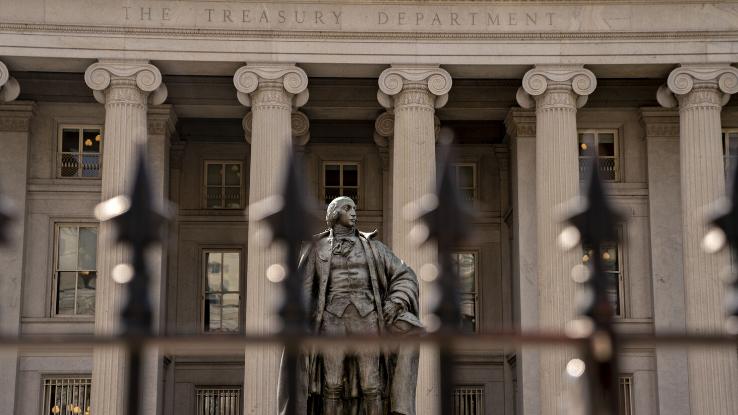Why Are the COVID-19 Relief Stimulus Checks from the IRS Delayed for So Many Americans?

In the wake of the COVID-19 pandemic, unemployment rates have risen sharply. To mitigate the spread of the novel coronavirus, many businesses have temporarily shuttered, employees have been furloughed and, in some cases, folks have lost their jobs outright. As April comes to a close, roughly 30 million Americans have filed for unemployment, leaving many to wonder how they will pay their bills or afford groceries. To help relieve the financial strain caused by the far-reaching complications of the novel coronavirus, federal lawmakers enacted a $2 trillion economic stimulus package, called the CARES Act, on March 27 that allowed for most Americans to receive checks of up to $1,200 to help navigate the COVID-19 pandemic fallout.
So far, roughly 90 million Americans have received their payments, and as of April 24, 2020, the IRS has paid out roughly $157.96 billion — more than half of the $290 billion that was set aside for Americans as part of the $2.2 trillion CARES Act. But for many Americans, coping with the financial consequences of COVID-19 without that stimulus check is still a reality. The Washington Post reports that “Many still waiting for their $1,200 payment are low-income veterans and Social Security beneficiaries.” So, why the delay?
Top Reasons for Stimulus Check Delays
If you file your federal income taxes each year and use direct deposit for those potential tax refunds, you most likely received your stimulus check as soon as payments started and without any issues. However, there are quite a few reasons your stimulus check could be delayed, including:
- Bank Account or Direct Deposit Issues: According to MarketWatch, approximately 14 million Americans don’t have bank accounts. To that end, the Federal Deposit Insurance Corporation (FDIC) suggests opening a bank account to receive the stimulus money in a more timely fashion. (A bank account might also help you bypass check-cashing fees.)
- Snail Mail: If the IRS doesn’t have your banking information on hand, you will likely receive a paper check. In fact, the IRS plans to mail about 5 million checks each week for up to 20 weeks, meaning folks will receive their payments in phases. Those with the smallest incomes will receive checks earlier in the process.
- You’ve Been Claimed as a Dependent: If you’re a young adult, you may be missing out on the stimulus payments because your parent or guardian has claimed you as a dependent (anyone under age 17). Even if you are not a dependent this year, this could be a problem if you were claimed as a dependent on a 2018 return.
- Immigration Status: While undocumented immigrants (and, potentially, their spouses who are citizens) are not eligible for stimulus payments, legal permanent residents — or green card holders — are eligible, with a few exceptions. However, if your green card application is pending, you unfortunately won’t be getting a check any time soon: The U.S. Citizenship and Immigration Services (USCIS) field offices are closed through June 3 due to the pandemic.
- Debt Collectors: Unfortunately, the wording of the CARES Act does not prevent private debt collectors from taking stimulus checks once they hit recipients’ bank accounts. While some debt collectors claim to be acting with “compassion” during these challenging times, approximately 10 states as well as Washington D.C. and several cities and counties are enacting orders to prevent debt collectors from seizing stimulus checks.
- Social Security or Supplemental Security Income Recipients: According to the American Association of Retired Persons (AARP), individuals who are collecting Social Security benefits for retirement or for disability or Supplemental Security Income (SSI) will still be eligible for stimulus payments. Low-income Social Security recipients will receive the full $1,200 check if they filed with income of $75,000 or less in 2019. The IRS planned to mail these checks the week of April 27.
- Immigration status: If your green card is pending, you will most likely see a delay in receiving your stimulus check until at least mid-June. However, if you are an undocumented immigrant living in the U.S. or if you are a U.S. citizen married to someone who is an undocumented immigrant, you are ineligible for federal payments. If mixed status couples file separately, the partner who is a citizen may still qualify for benefits — though most couples file jointly to further prove the legitimacy of their marriage.
- Glitches: If you use a tax preparer like H&R Block and Jackson Hewitt, you may have opted to have your money loaded onto a debit card in the past. These prepaid cards can be used for stimulus checks too, but this complicates things as the IRS might not be putting the payment in the right account.
Even if you don’t make enough to file tax returns, you can submit your information to receive payments.
If you have a bank account (or if you open one now), you can submit your account information via the Non-Filers IRS webpage. If you file taxes but do not provide the IRS with your banking information — small business owners and those who are self-employed often owe money and don’t provide direct deposit information — you can still submit direct deposit information through Get My Payment, an IRS tool that updates once per day, overnight.





